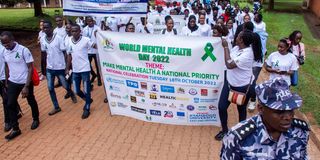Claims of mentally ill MPs not true - House

People march during World Mental Health Day celebrations at Kyambogo University in Kampala on October 18, 2022. PHOTO | ISAAC KASAMANI
Parliament has dismissed as “false” claims by the House Forum on Mental Health chairperson, Mr Geoffrey Macho, that half of the 529 Members of Parliament (MPs) are depressed.
Speaking at the World Mental Health Day celebrations held at Kyambogo University, MP Macho, who represents Busia Municipality in the 11th Parliament, said “mental health is a public health concern that must be given attention”.
“Where ever you get a hundred members of Parliament, 50 of them are depressed,” he said, adding, “To prove that, come to Parliament at noon; you will get more than 20 percent of the MPs talking to themselves, which is a sign depression.”
The claims by Mr Macho were not backed by scientific studies and Parliament’s Director of Communications and Public Affairs, Mr Chris Obore, said health specialists, not observers, can diagnose mental illness.
“I can appreciate that he wanted to draw attention to the problem as a way of increasing awareness. I don’t think that MPs are too exposed to depression. Mental health illness can be proven after a diagnosis has been done,” he said yesterday.
The Tuesday celebrations were held on the theme, ‘Make mental health a national priority.’
In his subsequent comments to this newspaper, MP Macho said his colleagues are troubled by heavy workload and other issues he deemed “too sensitive” to discuss.
“MPs work without rest as they play their oversight and legislative roles. Other factors are controversial and I’m not comfortable sharing them,” he said.
Some of the legislators, without acknowledging the claims of widespread depression among them, identified unending demands by constituents, loan servicing obligations, and relationship challenges as key burdens for the people’s representatives.
Regular House visits
Many of the lawmakers hold lone conversations in the corridors of Parliament, Mr Macho said, while professional psychologists and psychiatrists in House regularly counsel visibly disturbed colleagues.
Dr Christopher Komakech, the Aruu County MP, refuted the claim that half of the legislators are depressed, but admitted that like other citizens, they feel sad or stressed.
“About 90 percent of problems that the MPs face are financial. Some of them may be battling court cases after elections, they are expected to meet financial needs of some of their electorates and their extended families. Some borrow money to finance their campaigns and all these things make them feel sad or stressed,” he said.
A neuro technologist with qualifications in psychiatry, Dr Komakech, a member of Parliament’s Forum on Mental Health, said for someone to be depressed, they must feel sad for at least 21 consecutive days or more.
“Almost 50 percent of depressed people commit suicide. Have you ever heard of an MP who committed suicide?” These fellows are just stressed, not depressed,” he said, citing increased appetite, constipation and loss of interest in daily activities among symptoms of depression.
At the Kyambogo University event, MP Macho implored stakeholders to take mental health campaigns from boardrooms to communities to help them deal with the triggers of mental illnesses such as drug abuse, alcoholism, domestic violence, economic hardships and stressful jobs and unfriendly school programmes. Kampala City Minister Minsa Kabanda, seconded by Mr Macho, last moved a motion in Parliament to mainstream mental health issues at all levels and in all sectors.
Health Minister Dr Jane Aceng is expected to make a rejoinder to the motion, including a proposal for the ministry to create a full department to exclusively handle mental health matters.
“Every person in every part of the country is depressed. Research has quoted that 14 million people in Uganda are suffering from mental illnesses, but they are more,” Mr Macho said, without providing the basis for his assertion.
In a rejoinder, Dr Hafsa Lukwata, the assistant commissioner for mental health, alcohol, and substance abuse at the Health ministry, said they have designed a five-year strategic plan, starting this year, to strengthen the leadership and coordination of mental health services.
“Within the first three years of this strategic plan, all the 142 districts will have mental health focal persons, strengthened care, strengthened school health, workplace health and those who have been treated for mental illnesses are helped to get back to their communities,” she said.
Dr Lukwata revealed that 75 percent of patients who seek mental health services leave without being diagnosed and even those that are diagnosed may not receive the right service because the capacity of health workers in this area is still wanting.
Statistics at Butabika, the country’s only national referral hospital for psychiatric care, shows that seven in every 10 mentally ill Ugandans are young people.
The distresses caused by Covid-19 and associated lockdowns exacerbated the mental illness situation in Uganda and globally, Dr Lukwata said yesterday.
Minister Kabanda, who attended yesterday’s celebrations, urged Ugandans to share their problems with trusted individuals because “a problem shared is a problem half-solved”.
The World Health Organisation’s Public Health Officer in Uganda, Dr Dayo Segun Fatunmbi, said mental health is global issue that should be given higher priority.
Worrying trend
According to the National Institute for Health Research, about 35 percent of Ugandans suffer from a mental disorder and 15 percent of them require treatment.
There has been a 15 percent rise in the cases of mental health conditions in the country following the outbreak of the Covid-19 pandemic, statistics from the Ministry of Health indicate.




